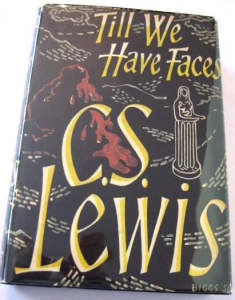More than we usually recognize, the way we experience life depends on our internal interpretation of circumstances more than it does on external factors of our situation. C.S. Lewis illustrated this point well in Until We Have Faces.
Lewis tells the story of two sisters – Orual and Psyche, who are princesses in the Kingdom of Glome. To get to the point that spoke to me in the story – everything is going well until the Priest of the goddess Ungit comes to the king to tell him that Psyche must be sacrificed to the goddess. Psyche is drugged and chained to the sacred tree, where she is left to be eaten by the Shadowbrute.
to me in the story – everything is going well until the Priest of the goddess Ungit comes to the king to tell him that Psyche must be sacrificed to the goddess. Psyche is drugged and chained to the sacred tree, where she is left to be eaten by the Shadowbrute.
A few days later, Orual returns to the tree to give her sister’s bones a proper burial. When she arrives, Psyche’s bones are nowhere to be found. She wanders over to the river, crying, when she looks up to see Psyche standing on the other side of the river. Orual is shocked. She doesn’t know what to think. How is it possible? She knows that Psyche is dead. How can this be true?
Orual crosses the river and she and Psyche embrace. Psyche then tells her sister the story of how the god of the west wind saved her from the shadowbrute and brought her to his palace to be his bride. Orual think Psyche has lost her mind. To humor her, she listens to Psyche’s story as if she believes it.
Psyche leads Orual a short distance away to sit in the heather. There she serves a glass of wine to Oural – the choicest of wine in an exquisite goblet. She asks Orual if she likes the goblet and the wine. Orual goes along with her and nods, but what she actually sees is her sister cupping her hands in a pool of water. She is sure Psyche has lost her mind.
Psyche goes on to tell Orual stories of gods and palaces and how she wears the most beautiful gowns. Orual sees no palace, only woods. No gowns, only Psyche dressed in rags. After awhile she can bear it no longer and demands that her sister show her the palace.
Orual is dumbfounded when her sister nods with a smile and says, “Of course I will. Let us go in.” Orual asks, “Is it far?” “Far to where?” Psyche responds. “To the palace,” Orual shouts, “to your god’s house!”
Psyche starts to tremble. “Orual, what do you mean, is it far?” “Mean?” Orual asks. “Where is the palace? How far have we to go to reach it?” Psyche starts to cry. Through her tears and cries, she stares into Orual’s eyes and answers, “But this is it, Orual! Can’t you see it? You are standing on the stairs to the great gate!”
Two people in the same situation. One saw a palace. The other saw only trees. One tasted expensive wine while the other tasted only water. One saw a beautiful gown. The other saw rags. One saw great pillars at a palace entryway. The other saw only trees.
Orual was right on the steps of the palace, but she couldn’t see it. Her perspective was skewed by a faulty paradigm. What Psyche saw was real, but Orual just couldn’t see it.
What do you see when you look outward? Do you see the “lower-case reality” or the all uppercase REALITY around you. One approach is to see life through the thin lens of natural senses. The other is to see through the lens of faith. Faith doesn’t create anything. It simply sees what is there. It looks beyond superficial senses and sees supernatural, ultimate reality. I wonder how many times we taste brackish water when we’ve been given fine wine; how often we see stumps instead of ivory pillars; how often do we see rags when we’ve been given riches? Choose today to look beyond the shallow view and see the depth of truth that can only be enjoyed when we look through the eyes of faith.
